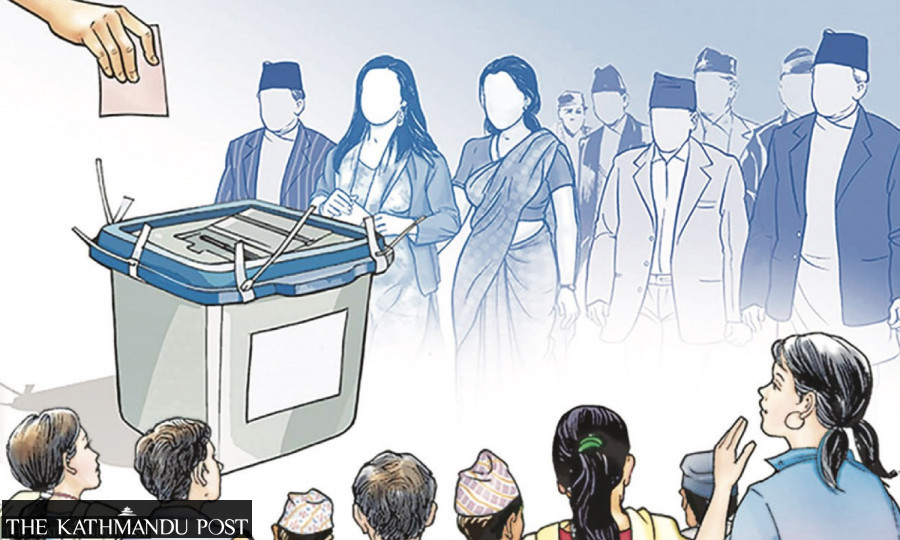Columns
Voting for the independents
Their election victory will send a message to the political lifers and their servile cadres.
Naresh Koirala
I met Brinda (not her real name) in a Nepali house in Seattle, Washington, a couple of months ago. A lean, elderly lady associated with the Nepali Congress, particularly with Sailaja Acharya, she had participated in the famous black-flag protest Acharya led in 1960. This act of courage is etched forever in the annals of Nepal’s struggle for democracy. I knew a number of the women involved in the protest, but did not know Brinda was also there.
Given the current state of Nepali politics, millions of Nepalis share Brinda’s despondency. Hundreds of thousands have left the country in desperation. There is a consensus that maleficent politicians, particularly leaders of the major parties, have brought the country to the state it is in. They run their party as their fiefdom. They use their power and the instruments of democracy to enrich themselves at the expense of ordinary people. There will be no change unless they are forced to retire, and the political parties are democratised. Can the coming election be a catalyst for change? Who to vote for? Let us start with the second question first.
Unholy alliances
As the election approaches, the electorate is grappling with the question. Elections are about choice and change, but many feel they have little to choose from. They have watched the performance of all the major parties and see no substantive difference. All of them seem to have abandoned whatever guiding political ideology they had. Their focus is on winning elections, forming the government, enriching the party and its leaders, and prolonging the life of their government. The common man is not their priority. “All political leaders and their parties are the same,” Bal Bahadur Thapa, a taxi driver in Kathmandu, told me. “Their interest is in nothing other than money and power”.
The so-called Gathbandhan alliance between the Nepali Congress, Communist Party of Nepal (Maoist Centre) and other parties attest to Thapa’s comments. There is neither ideological congruence nor a common development platform amongst the parties in the coalition. It also does not matter that the Maoists have betrayed the Nepali Congress several times in previous alliances. The purpose of the Gathbandhan is simply to win a majority of seats in Parliament for its candidates to enable it to form the post-election government and benefit from the easy access to the public treasury that control of the government provides. Prime Minister and Congress President Deuba has said, “We will not win without the Gathbandhan.” The ultimate objective is to win, not to advance the ideas the party stands on, not to serve the people. The party has no ideas to stand on; public service is not a priority.
The CPN-UML led by KP Sharma Oli is no different. They have joined hands with their erstwhile enemy, the pro-monarchy Rastriya Prajatantra Party and Janata Samajwadi Party, which until a few days ago, was bargaining with the Congress to maximise their chances of winning. This opportunistic alliance, the UML hopes, will help them beat the Congress-led alliance and form the government.
Under these circumstances, the question of “who to vote for” makes perfect sense. But the electorate is not without choice. There is a choice if this election is used as an opportunity to upend the hegemony of the major parties and usher in a new era in Nepal’s political development.
Many young, highly educated Nepalis are anxious to change the country’s political culture. Disgusted with the moral decay of the major parties and their leaders, they are contesting the election as independent candidates. Besides, a number of long-time cadres from the major political parties have rebelled against their leaders’ dictates and are contesting the election as independents. And there are well-meaning young men and women who have formed new parties to challenge the older parties. They all-called independents from here onwards—provide an alternative to voting for the major parties’ yes men.
Catalysts for change
An independent candidate may be successful in an executive position like a city mayor, but he will have little say in passing legislation in a Parliament dominated by party cadres. But the election of a number of determined independents with unshakable public service commitments can help shape public opinion against maleficent politicians and their anti-people policies. Their victory will send a message to the political lifers—politicians who never retire—and their servile cadres. It will also encourage the younger generation of cadres struggling to transform their parties from the leader’s fiefdom to functioning democratic institutions.
The elected independents must be those with respect for themselves and the people at large, the courage to speak the truth and strong moral and ethical underpinning. They must be dedicated to public service, and above all, people-centred rather than self-centred. Political parties will try to lure them into their fold through enticements of money and power. They must have the strength of character to reject such lures.
Voting for independents is not denying the idea of political parties; it is rejecting the political parties as they are; it is rejecting the fiefdom of the political bosses. The independents will bear heavy pressure on the political parties to reform, a reform so serious they cannot ignore it. As parties reform, I expect they will join the reformed parties. They have to because the country’s socio-economic development that they, Brinda and we all envision cannot be achieved by independents acting alone. But, at this stage of Nepal’s democratic development, independents can be powerful catalysts to change the character of political parties, strengthen intra-party democracy and take Nepal where we all want to be: a free and prosperous country under a multi-party democratic polity.




 8.26°C Kathmandu
8.26°C Kathmandu















